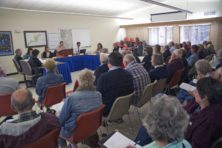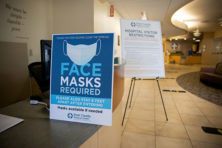Discourage Fraud By Asking Questions
- Share
- Tweet
- Pin
- Share
As we all know by now, the Door County Humane Society appears to have been the victim of fraud perpetrated by a former employee. Sadly, this is not the first time a local charity has been duped by shady individuals. From a child care center to a local church, Door County has learned the hard way that fraud can exist in our small community of nonprofits just as it does among the giant Enrons and WorldComs of the for-profit world.
Recently, I had the opportunity to visit with Marilyn Jensen, president of the Door County Humane Society, and board member Clay Bonin. It was heartening to learn how hard these and other volunteers were working to clean up the mess that had been created. The steps they say their organization is taking to strengthen their internal controls seem very reasonable and appropriate. With the removal of the alleged thief from their staff, and assuming that new internal controls are implemented properly, it’s very likely that your contribution to the Humane Society was never safer than it is today.
Yet there is a lesson that the rest of us should take from this fiasco. I’ve written about it in the past, but it bears repeating today. With the implementation of robust internal controls, volunteer boards and professional staffs of our local charities can significantly reduce the likelihood of fraud in their organization.
Internal controls are a system of processes put in place to ensure the integrity of financial and accounting information. Every good charity will have good internal controls. Good internal controls, in turn, require processes that are written down. As a donor, you should never hesitate to ask a charity for a summary of their significant internal controls.
Here are a few simple questions you might consider asking before you make your next substantial gift to your favorite charity:
Are the people who sign the checks different from those who reconcile the checkbook?
While most Door County charities have few people on their professional staff, there still should be one inviolable rule. The person who signs the checks should never be the person who reconciles the checkbook. Never. There is no reasonable exception to this rule.
The person reconciling the organization’s checkbook should closely scrutinize all activity until they are confident that every transaction is appropriate. If there is any question, the person doing the reconciliation should request to see the invoice or other documentation justifying the expenditure. For example, a simple division of duties would have the treasurer write the check, the president or vice-president authorized to sign the check, then the treasurer reconcile the checkbook. There are countless other ways to divide up these tasks, but the key is that they be divided. This simple step of separating duties is relatively easy and yet dramatically reduces one of the most common forms of fraud.
How do you ensure your charity’s corporate credit card is being used appropriately?
Corporate credit cards require a special level of scrutiny. Too often, the person signing the check simply makes a single payment to the credit card company without examining the underlying charges.
Each individual charge should be reviewed as a separate transaction. The person using the credit card should be required to present an itemized receipt and explanation for each individual charge. A charge slip that is not itemized should not be considered sufficient. It’s too easy for someone to “add on” a few personal items to a credit card charge unless there is an itemized list showing everything that was purchased.
Abuse of a charity’s corporate credit card is the “slow leak.” It doesn’t usually involve large instances of fraud, but taken collectively over many years, the amount stolen can be enormous. Yet it can usually be prevented if there is proper scrutiny given to individual charges on corporate credit cards.
How often do you inventory your fixed assets?
While charities are nonprofits, they are also businesses. Like every business, they have substantial investments in fixed assets such as desktop computers, laptops, tablets, office chairs, desks, filing cabinets, fixtures, and vehicles. That purchase of a new tablet for the office might have been perfectly legitimate when made, but how do you know that it hasn’t been taken home and now is primarily for an employee’s personal use?
On at least an annual basis, every charity should be taking an inventory of its fixed assets. It needs to be sure that the equipment purchased with its donors’ money is being used for the charitable purpose for which it was intended.
Do you have documented financial processes and will you share with me a summary of your significant internal controls?
At the Door County Community Foundation, we have mapped out virtually every financial process, looked for possible opportunities for fraud, and developed systems to dramatically minimize if not eliminate them. Where we couldn’t completely eliminate the possibility of fraud we instituted robust reconciliation procedures as a deterrent so that the thief knows it won’t be long before their crime is uncovered. We have documented all these processes and we revisit them on a regular basis.
The Community Foundation also has a summary of our most significant controls available for any donor who might wish to review them. Thankfully, the Community Foundation is not unique in the charitable world. There are a lot of great charities in Door County that do the same thing. Unfortunately, there are still some organizations that don’t put as much thought into their internal controls as they should. If more donors and board members ask questions about how a charity handles its finances, it will encourage every organization to do a better job protecting the generous gifts of their donors.
Bret Bicoy is president & CEO of the Door County Community Foundation. Contact him at [email protected].


